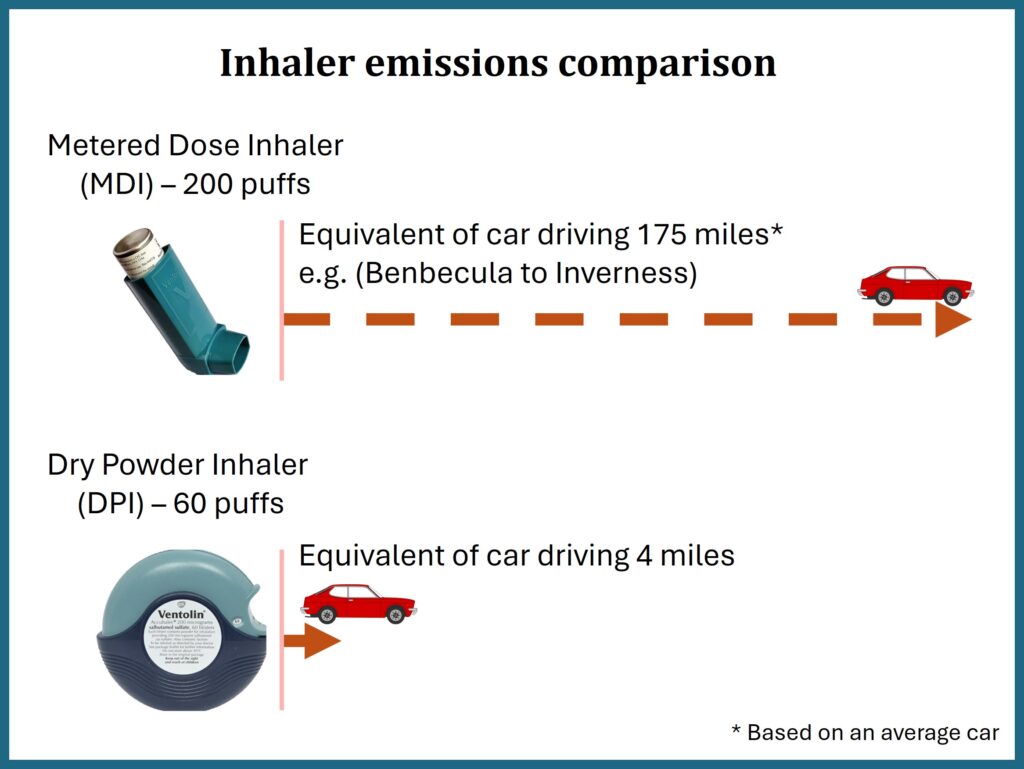Heading 2
Reducing Inhaler Emissions in NHS Western Isles
Published on 20 May 2025
Efforts to reduce inhaler-related emissions are gathering pace and NHS Western Isles is leading the way with innovative green prescribing initiatives. With climate change recognised as a public health emergency, tackling the carbon footprint of metered-dose inhalers (pMDIs) is both an environmental and clinical priority.
Pressurised metered-dose inhalers (pMDIs) rely on gas propellants that contribute around 3% of total NHS greenhouse gas emissions. If not disposed of properly unused gases can also leak into the atmosphere. A single pMDI can have a carbon footprint equivalent to driving almost 180 miles by car. Dry powder inhalers (DPIs) do not use these gases, making them a greener alternative.
This reality inspired change at Benbecula Medical Practice after attending the Rural GP Association of Scotland annual conference. “The slide showing the difference between a metered dose and dry powder inhaler was startling,” Dr Kate Dawson said. “It made me rethink our entire prescribing approach.”
Practice-Led Change
Benbecula Medical Practice quickly translated concern into action and adopted a range of steps:
- Clinical and staff meetings were used to share data and discuss practical steps and options.
- Staff completed training and up-to-date inhaler prescribing guidance was displayed in consulting rooms.
- Updated prescribing guidance was implemented to favour greener options and the specialist respiratory nurse reviewed patients to switch them to DPIs.
- Information was shared on noticeboards to inspire patients and explain the reasons for change.
- Focusing on prevention, rather than relief of symptoms, results in fewer inhalers in use.
This work has been very successful and between December 2022 and December 2024 they have reduced their inhaler-related emissions by over 40%!
Other NHS Western Isles Actions
The Western Isles Hospital Pharmacy team and prescribers are also embracing sustainability:
- Pharmacy dispensing bags will be labelled to remind patients to return used inhalers to the pharmacy or dispensing practice for proper destruction. Posters will also be displayed in community pharmacies and practices.
- Staff and patients are being reminded to use appropriate disposal bins for used inhalers.
- Updated prescribing guidance is used to signpost prescribers toward more sustainable inhalers.
- Patients are assessed for suitability to switch from pMDIs to DPIs, or to other more sustainable inhalers, as appropriate.
- Prescribers have new asthma guidelines available, focusing on reducing the number of inhalers issued through better disease control.
These efforts are aligned with national targets to make NHS Western Isles more environmentally sustainable. As Benbecula’s team have proven, once the impact of inhaler emissions is made visible, colleagues and patients alike are ready to embrace change.
Dr Dawson said, “The most effective step was to talk about the massive environmental impact of MDIs vs DPIs. Once people are inspired, there’s no stopping them.”

- NEXT PAGE: Health Protection and Immunisation
- LAST REVIEWED ON: May 20, 2025